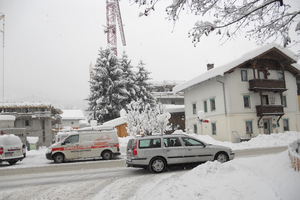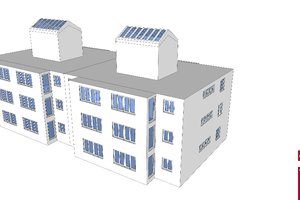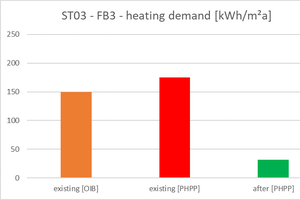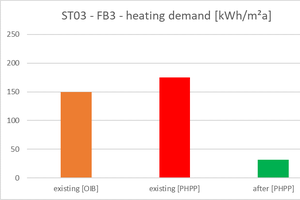Case Studies
ST03-BOZ11 in St. Johann, Tyrol
Tyrol, Austria
Code: CS22
Original situation
This residential building is located in the Südtiroler Siedlung district of St. Johann, Tyrol (Austria). It is owned by Neue Heimat Tirol (NHT), Tyrol’s social housing association and was built in the early 1960s. Since then it has remained largely unchanged with the exception of a façade renovation in the 1980s, which added 6 cm of external cork insulation. The building has 8 flats on 3 stories with a total living area of about 559 m². The roof and floor are not insulated and the windows are double glazed and not airtight. Each flat is heated separately and the hot water systems are also decentralised. A connection to a natural gas pipeline as well as to renewable based district heating exists. The current heating demand of the building is about 153 kWh/m²y (as per the national energy certificate) with an estimated average of 13 kWh/m²y in energy demand for domestic hot water (DHW). The current final energy consumption of the building for heating and DHW is about 283 kWh/m²y. No cooling devices are currently installed or needed. Note: This project is very closely related in terms of location and typology to outPHit case study ATCS02, ST03-FB3 & FB5.
Modernisation proposal
A complete renovation according to EnerPHit criteria including full thermal refurbishment of the façade, top floor ceiling, basement ceiling and triple glazed windows. All components to be used are of Passive House quality. Existing thermal bridges will also be largely minimised. Existing balconies will be demolished and new ones will be connected to the thermal envelope with as little thermal bridging as possible. Ventilation with heat recovery will be added and the current, decentralised, tenant-dependent heat supply will be exchanged for a central, renewable-based heat supply.
Efficiency improvement
An improvement in energy efficiency of up to 84% is expected with the measures planed.
PHPP verification sheet before retrofit
| TFA | existing treated floor area (usable floor space) |
559.0 m2 |
|---|---|---|
| Space heating | Heating demand |
203.49 kWh/(m2a) |
| Heating load |
– W/m2 |
|
| Space cooling | Cooling & dehum. demand |
– kWh/(m2a) |
| Cooling load |
– W/m2 |
|
| Frequency of overheating (> 25 °C) |
0.0 % |
|
| Frequency of excessively high humidity (> 12 g/kg) |
0.0 % |
|
| Airtightness | Pressurization test result n50 |
2.0 /h |
| Non-renewable Primary Energy (PE) | PE demand |
– kWh/(m2a) |
| Primary Energy Renewable (PER) | PER demand |
– kWh/(m2a) |
| Generation of renewable energy (in relation to projected building footprint area) |
– kWh/(m2a) |
|
| EnerPHit classic |
no |
PHPP verification sheet after retrofit
| TFA | existing treated floor area (usable floor space) |
559.0 m2 |
|---|---|---|
| Space heating | Heating demand |
32.01 kWh/(m2a) |
| Heating load |
18.3 W/m2 |
|
| Space cooling | Cooling & dehum. demand |
– kWh/(m2a) |
| Cooling load |
– W/m2 |
|
| Frequency of overheating (> 25 °C) |
5.0 % |
|
| Frequency of excessively high humidity (> 12 g/kg) |
– % |
|
| Airtightness | Pressurization test result n50 |
0.55 /h |
| Non-renewable Primary Energy (PE) | PE demand |
49.0 kWh/(m2a) |
| Primary Energy Renewable (PER) | PER demand |
287.0 kWh/(m2a) |
| Generation of renewable energy (in relation to projected building footprint area) |
– kWh/(m2a) |
|
| EnerPHit classic |
no |
Key facts
Building typology
Multi family dwelling
Existing treated floor area (usable floor space)
559 m2
Building owner
NEUE HEIMAT TIROL
Consulting outphit partner
NEUE HEIMAT TIROL
Project status
Planning phase
Contact

Harald Konrad Malzer
R&D
NEUE HEIMAT TIROL
Teléfono: 0043 512 3330 457
E-Mail: malzer@nht.co.at





